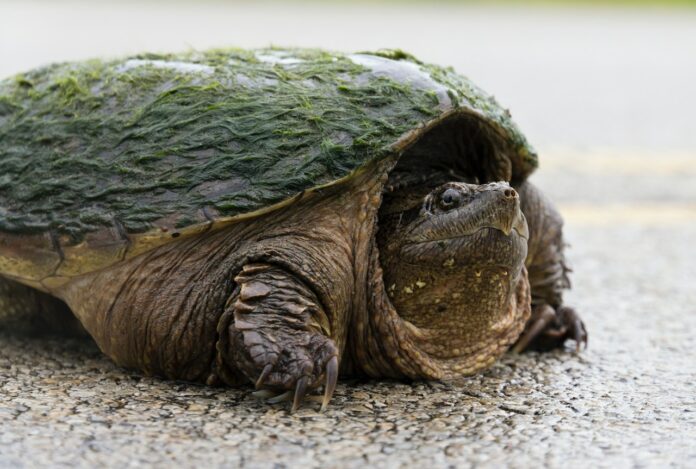It’s National Wild Turtle Week and in New Hampshire it is also the beginning of turtle nesting season, when these shelled reptiles move from wetlands and vernal pools to their upland nesting sites. Nesting season lasts from mid-May into early July, reaching maximum intensity in June.
One of the most significant threats to turtle populations in the Granite State is being struck by vehicles on roadways. While male turtles may travel over land to different wetlands and upland basking areas in search of food and for breeding, mature female turtles leave their home ponds and wetlands every spring to lay their eggs, sometimes traveling distances of over one mile, and returning to the same nesting location each year. Their nesting sites are often open, sandy or gravely areas that can be located great distances from wetland areas. This annual journey often means that turtles need to cross roads to reach their destinations.
“Turtle nesting season provides us with a unique opportunity to see many of the state’s turtle species moving on land, but it is also an extremely vulnerable time for them,” said NH Fish and Game Department Wildlife Biologist Melissa Winters. “We can all do our part to help turtles safely reach their nesting habitats by slowing down when driving and keeping an eye out for them as they cross roadways in the coming weeks.”
Here are a few things you can do to help New Hampshire turtle populations stay abundant and healthy:
- Slow down and watch for turtles in roadways.
- Help turtles cross roads safely. If you see a turtle crossing a road, and it is safe for you to do so, help it cross in the direction it is traveling. Never create a dangerous situation for other motorists or yourself. Snapping turtles should be handled with extreme care or allowed to cross on their own.
- Do not take the turtle home. A turtle taken from its habitat is a turtle lost from the local population. All native New Hampshire turtles are protected by state law during nesting season, and several New Hampshire species are protected by state law from collection year round.
- Do not move the turtle from where you found it. Even if a turtle is a great distance from a wetland area, they are not lost and know exactly where they are going. Moving a turtle to a different location can be stressful for the animal and may even result in death if they are unable to adjust to their new surroundings.
- If you find an injured turtle, call NH Fish and Game’s Wildlife Division at (603) 271-2461 for a list of licensed wildlife rehabilitators in your area or visit www.wildnh.com/wildlife/rehabilitators.html. For more information on what to do if you find an injured turtle, visit www.wildnh.com/nongame/turtles-injured.html.
- Report turtle sightings (living or deceased) to NH Fish and Game’s Reptile and Amphibian Reporting Program at nhwildlifesightings.unh.edu. Note the location, date, and time of observation, and include photos if possible.
- Work with land trusts and town officials to help conserve important natural areas for turtles in your community.
- Spread your garden mulch as soon as possible because an idle pile can be an attractive place for turtles to nest when located near wetland areas. If mulch will be piled up for several days or more, covering it with plastic will help reduce its attractiveness to nesting turtles.
- Learn more about Wild Turtle Week at fws.gov/initiative/protecting-wildlife/wild-turtle-week.
- Learn how to identify New Hampshire’s seven native species of turtles by visiting www.wildnh.com/nongame/turtles.html.
The Nongame and Endangered Wildlife Program at Fish and Game works with state and private partners to protect more than 400 species of mammals, birds, fish, reptiles, and amphibians, as well as thousands of invertebrate species in New Hampshire. Show your support for nongame and endangered wildlife in the Granite State; visit www.wildnh.com/nongame to donate today and help the Nongame and Endangered Wildlife Program reach its annual fundraising goal and actualize state-matching funds to support wildlife and habitat conservation.
